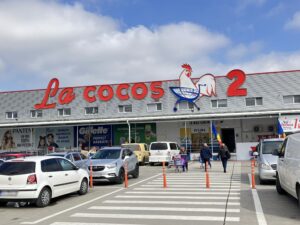Schwarz Group acquires Romanian big box operator La Cocoș
In a market shaped by hypermarket contraction and discount dominance, Schwarz Group’s majority acquisition of Romania’s La Cocoș signals a contrarian bet. While legacy players across Central Europe restructure oversized formats, the German retail group takes over a uniquely positioned challenger that defies the hypermarket decline.


Sebastian Rennack
international retail analyst
Aletos Retail
In a bold strategic move, Germany’s Schwarz Group – parent company of both Lidl and Kaufland – is acquiring a 70% majority stake in Romanian hypermarket operator La Cocoș. The seller is a consortium led by the EBRD, which had taken over majority ownership in 2024 alongside two private equity companies. This transaction confirms the unique sales concept of La Cocoș,
Continued market consolidation
The transaction marks another case of consolidation in the increasingly concentrated Romanian retail market. Already in April 2023, French retailer Carrefour moved decisively into consolidation mode by agreeing to acquire Louis Delhaize’s Cora operations – ten hypermarkets and nine urban stores – with the Romanian Competition Council approving the deal in October 2023. More recently, in December 2024, Dutch-Belgian Ahold Delhaize secured approval from the Romanian Competition Council to complete its acquisition of around 1,700 convenience stores and supermarkets from Profi Rom Food, following the initial announcement in October 2023. These high-profile acquisitions underscore a wave of consolidation in the sector, just ahead of Schwarz Group’s planned majority investment in La Cocoș.
No-frills warehouse-style concept
La Cocoș operates a distinctive large-format retail model based on warehouse-style hypermarkets. By the end of 2024, the chain ranked 14th among Romania’s top grocery retailers. Despite operating only three outlets at the time, La Cocoș generated net revenues of 1.178 billion RON in 2024, according to balance sheet data, equivalent to approximately €237 million. In local currency, this represents a 20.7% increase over the previous year’s turnover (976.9 million RON). On a per-store basis, La Cocoș achieved an average of approximately €79 million in sales in 2024, making it by far the highest-revenue hypermarket operator in the country.
High profitability despite niche existence
Profitability also improved significantly year-over-year, with the net profit margin reaching 3.1% of revenue, up from 2.0% the year before. For comparison, the market leaders Lidl and Kaufland achieved net profit margins of 5.1% and 0.8% respectively over the same period. Large-format hypermarket competitors Auchan, Carrefour (excluding Cora), and Metro Cash & Carry posted net profit margins of -1.1%, 0.4%, and -0.2% respectively in 2024. La Cocoș’s performance is especially notable given that, starting in 2024, Romanian legislation introduced a 1% minimum revenue tax on companies with annual revenues exceeding EUR 50 million.
BMPL and manufacturer brands at the core
The store concept emphasizes bulk purchasing, operating a “Buy More, Pay Less” (BMPL) pricing model with three distinct price tiers based on quantity purchased. The offer combines sharp price positioning with an industrial, no-frills presentation reminiscent of early hypermarket formats. The assortment, limited to around 12,000 SKUs per store, includes a mix of international and domestic manufacturer brands. This value-oriented but non-discount positioning has resonated with Romanian households that are both price-sensitive and brand-conscious.
Romania’s food retail landscape is already highly consolidated. Lidl and Kaufland, both owned by Schwarz Group, dominate the market, holding the top two positions by revenue. Yet La Cocoș has managed to carve out a niche by taking over former large retail sites (including ex-Carrefour locations) and expanding into regions underserved by modern hypermarkets.
Rollout expected
For 2025, La Cocoș plans to significantly expand its national footprint. The retailer intends to open three additional hypermarkets this year, in Craiova, Pitești, and Arad, following the January launch of its Brașov location. Its medium-term strategy includes the opening of 12 new stores over the next three to five years, with a goal of reaching at least 15 stores and a turnover of €1 billion by 2030. Store-level investments amount to approximately €6 million per location, split equally between layout and equipment on one side, and initial inventory on the other.
In a market where most large-format players are retreating or downsizing, La Cocoș has grown by betting on brands in a no-frills environment, volume, and proximity to value-seeking shoppers. With the backing of Europe’s largest retailer, the next chapter may include operational synergies with Kaufland or even international expansion. This acquisition sends a clear message: hypermarkets are not dead – at least not in Romania.
Related news
Lidl Magyarország wins Top Employer award once again
🎧 Hallgasd a cikket: Lejátszás Szünet Folytatás Leállítás Nyelv: Auto…
Read more >Related news
Tesco sets out store expansion plans in 2026 including five former Amazon Fresh sites
🎧 Hallgasd a cikket: Lejátszás Szünet Folytatás Leállítás Nyelv: Auto…
Read more >









